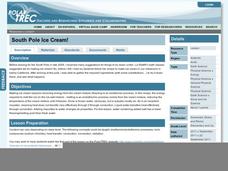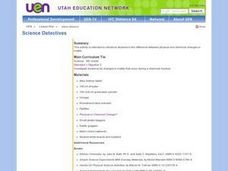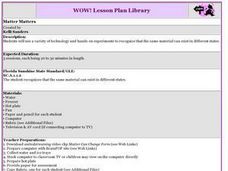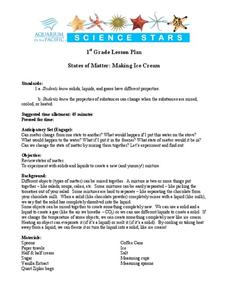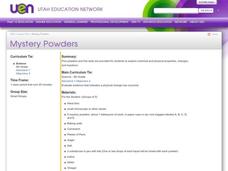Curated OER
Properties of Matter
Second graders investigate how objects can be described, classified and compared by their composition. They recognize that the same material can exist in different states. Students verify that things can be done to materials to change...
Curated OER
Science Jeopardy
Young scientists form teams and compete by providing questions for words and phrases related to science topics arranged in a Jeopardy quiz show game format. The categories include matter, measurement, vocabulary, and chemical or physical...
Curated OER
Physical and Chemical Changes
Students examine the different changes in matter. In this chemical change lesson students determine the amount of reactant made in a reaction using the law of conservation.
Curated OER
Matter: Build a Word
Fourth graders examine matter and the periodic table of elements. In this matter lesson, 4th graders discuss atoms and their composition. Students explore the periodic table of elements and use it to spell words out of the elements.
Curated OER
Chemical Changes
Eighth graders observe two types of interactions in a sealed plastic bag. One bag contains baking soda and water, and the other baking soda and vinegar. They determine what evidence indicates that a chemical change is occurring.
Curated OER
Water and Ice
Students explore water. In this water lesson, students explore the physical properties and states of water. They observe how water changes states and document what they see.
Curated OER
Phases of Matter
Eighth graders practice using correct vocabulary and apply content knowledge related to phases of matter when answering questions about situations or observations from everyday life.
Curated OER
Water and Ice
Students explore the physical properties of water. In this water lesson, students observe, measure, and describe water as it changes state. There are 2 extensions for this lesson that one can access via the Internet links provided.
Curated OER
Water Cycle Stories
Students explore the water cycle. In this water cycle lesson plan, students simulate the water cycle by placing an ice cube in a Ziploc bag and observing the changes which occur over time. Students record the mass of the Ziploc bag and...
Curated OER
Matter
Pupils complete a unit of activities to learn about states of matter and how to measure matter. In this matter lesson, students complete 8 lessons to learn about matter, its states, and how to measure matter.
Curated OER
How Does a Liquid Become a Solid?
Students explore the energy changes from a liquid to a solid. They model the arrangement of a solid and the change in states due to changes in energy using desks and chairs. Assessment questions are provided in lesson plan.
Curated OER
The Penny Factory
Fourth graders identify the characteristics of a simple physical and chemical change. They describe objects by the properties of the materials from which they are made and separate or sort items using these properties. Students explain...
Curated OER
The Same But Different
Fourth graders identify the characteristics of a simple physical change. They describe objects by the properties of the materials from which they are made. Students discuss the different states of matter and their distinct physical...
Curated OER
Properties of Matter (Biomaterial Through Nanotechnology)
Learners investigate friction between different surfaces. In this physics lesson, students research biomaterials that can reduce friction. They calculate efficiency using a mathematical formula.
Curated OER
Permafrost: Permanently Frozen Ground
Students explore permafrost. In this 3 states of matter lesson, students identify characteristics of solids and liquids. Students observe water and soil melting and freezing at various temperatures. Students make...
Curated OER
Water and Ice
Students explore water and ice. In this 3 states of matter lesson, students work with a partner to observe, illustrate, and describe the characteristics of an ice cube in a cup. The ice cube is observed again in 15 minutes and changes...
Curated OER
Observing Popcorn
Fifth graders discover the process of boiling water and how it is part of the changing of states of matter. They observe a kernel of popcorn pop in a test tube with water and take notes of how the water changes to the form of a gas....
Polar Trec
South Pole Ice Cream!
How can you turn an ice cream activity into a scientific investigation? It's easy if you know ionic compounds, heat transfer, and the exothermic and endothermic process. Learners will explore the science behind freezing, insulation, and...
Heritage Foundation
The Office of the Executive
An executive is not just a leader of a company; you can also use the term to describe the president of the United States. The ninth part of a 20-part unit teaches high schoolers about the importance of the executive branch and the...
American Chemical Society
Exploring Moisture on the Outside of a Cold Cup
As a stand-alone or as part of the intended unit, this is a valid investigation of what causes condensation to occur. By limiting the amount of air around a cold cup of water and comparing it to one out in the open, they find that...
Curated OER
Science Detectives
Fifth graders examine the differences between chemical and physical changes. As a class, they are read a scenerio and determine whether it was deliberate act or not. In groups, they observe the changes of an alka-seltzer tablet and...
Curated OER
Matter Matters!
Second graders experiment with heating and cooling and research the states of matter (solid, liquid, gas).
Curated OER
Making Ice Cream
First graders create ice cream in class. In this matter lesson, 1st graders discover solids, liquids and gases and the properties of each. Students produce a batch of ice cream in class using household items.
Curated OER
Mystery Powders
Fifth graders evaluate the physical properties of 5 powders. Each powder is subject to different conditions. They describe each observation as with a chemical change or a physical change.

















